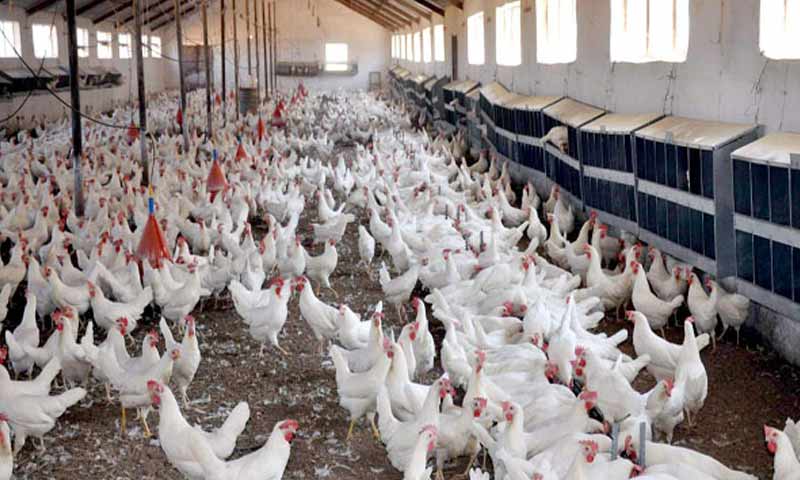Enab Baladi – Daraa
The prices of organic fertilizers made of composted poultry manure have soared in the southern province of Daraa, after a decrease in the quantities offered in the market, due to losses suffered by the poultry sector. This has resulted in a significant decline in raising poultry because farmers cannot afford rising production costs.
As monitored by Enab Baladi, the price of a cubic meter of broilers’ litter has reached 45 thousand Syrian Pounds (SYP- 20 USD), after it was 15 thousand SYP (6.6 USD) at the beginning of this year. Besides, the price of a cubic meter of egg-laying hens’ manure also increased to 60 thousand SYP (26.7 USD).
80 percent of farmers stop raising poultry
After many farmers gave up raising chickens, the quantities of fertilizers decreased in Daraa. They scarcely existed in its market, which is the main reason for the tripling of fertilizer prices.
The poultry sector has been decimated because of the high costs of raising chicken; there is a spike in the prices of fodder and medicines, most of which are imported and affected by fluctuations in the exchange rate of the SYP against USD.
The pound has hit 2,340 against the safe-haven US dollar on 24 September, according to the website of Syrian Pound Today (a Syrian Pound tracking website).
Ghazi al-Hari, a trader, working in transporting poultry manure fertilizers to farmers in Daraa countryside, attributed the high prices of poultry manure fertilizers due to the fact that few poultry farms are currently operating. Besides, these few working poultry farms have reduced their production by nearly half because they are unable to buy fodders and medicines.
The Director-General of the General Poultry Corporation, Siraj Khidr, confirmed in a statement to the government-owned daily newspapers “Al-Thawra”, on 23 June, that 70 percent of broiler farmers forcibly left the production process due to the financial losses that resulted from the high production costs, mainly the high price of fodder.
Khidr pointed out that the fodder constitutes 75 percent of the cost of the product, noting that all fodders are imported, predominantly yellow maize and soybean meal, stressing that many traders have monopolized the feed material to control its prices in the markets.
Agricultural engineer Ahmed al-Nuaimi highlighted in a previous interview with Enab Baladi that the difficulty of ensuring effective medicine, the high prices of the imported drug, the absence of veterinarians supervising the work of poultry, the poor experience of poultry farmers, and the massive financial losses incurred by poultry owners, forced poultry breeders to suspend the work of their farm until further notice.
Chicken manure enhances soil fertility and crop productivity
An agricultural engineer, on condition of anonymity, told Enab Baladi that poultry manure fertilizer is divided into two types: the first type is a 45-day old broiler chicks’ manure while the second type is manure and litter from egg-laying hens. These hens live for three years or more.
The egg-laying hens’ manures are characterized as being richer in nutrients and give different results than the rest of the litter, which explains the reason for their high prices.
The engineer added that poultry manure disintegrates the soil and enhances its fertility. Besides, the poultry manure is considered a nutritional source for soil microorganisms and helps the ability of soil to retain water and nutrients absorbed by the plant roots.
The use of organic fertilizers in its correct technical form helps reduce the use of mineral and chemical fertilizers.
He pointed out that poultry droppings are better manure than cow dung (or other livestock manure). Unlike most other livestock, such as cattle, cows, sheep, and goats, chicken forage for themselves, in addition to a small number of fodders, is given. On the other hand, livestock relies primarily on prepared fodder.
High price of chicken manure fertilizers increase agricultural production costs
The high price of chicken manure fertilizers places additional pressure on the farmer’s budget. There is an increase in the prices of mineral fertilizers, medicines, essential requirements for agricultural production, labor costs, and fuel.
Abd al-Karim al-Hussein, a farmer in rural Daraa, told Enab Baladi that he does not have the financial capacity to comply with all these requirements. He expected a real loss as the prices of chicken manure fertilizers continued to rise.
Another farmer described the rise in the prices of chicken manure fertilizers as a “devastating blow to the farmer.” He indicated that the prices of vegetables no longer cover the costs of their production, explaining that one dunum needs 135 thousand SYP (60 USD) for purchasing fertilizers only, in addition to additional fees that make the farmer think about reducing or canceling the preparations of the next planting seasons.
Abdel-Hakim al-Masri, the minister of finance and economy of the Syrian Interim Government (SIG), said in a previous interview with Enab Baladi that farmers would reduce the cultivated areas in the upcoming seasons, owing to a rise in the crop production costs and a decrease in their prices along with an increased supply of crops in the markets.
This coincides with the fact that 83 percent of Syrians are below the poverty line. Thus, most Syrian people also become reluctant to buy vegetables and fruits if their price rises, which means a real loss for farmers.
In Daraa, 734 poultry farms are licensed to produce broilers, and 100 poultry farms are licensed to produce eggs. The town of Kafr Shams in the northern countryside of Daraa is considered the market leader in producing eggs and broilers in the governorate. Poultry production accounts for 25 percent of the governorate’s total production.











